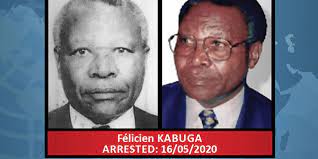
The trial of Félicien KABUGA started on September 29th 2022 in The Hague courtroom of the Residual Mechanism for the International Criminal Tribunals. The accused is charged with six counts: One count of Genocide, One count of Direct and Public Incitement to Commit Genocide, One count of Conspiracy to Commit Genocide and Three counts of Crimes Against Humanity, namely Persecution on political grounds, Extermination, Murder.
WITNESS EXAMINATION AND CROSS-EXAMINATION
Continuation of the cross examination of protected witness KAB093 about RTLM’s anti-Tutsi broadcasts & their effect.
The accused has again chosen to not be present during the hearing.
The first part of today’s hearing was conducted in camera, in order to protect the witness’ identity. When the public session resumed the Defence asked the witness about events that took place in or near the neighbourhood she lived in, which was in the surroundings of Kigali.
The witness had testified previously that RTLM had broadcast lies about her father, saying that he had trained and driven people from the neighbourhood to join the RPF. According to the witness, there were people from the village who had joined the Inkotanyi, but her father had nothing to do with them. She also mentioned that she is not very sure about who stayed or who went to the front, because people sometimes left the neighbourhood to sleep somewhere else, to find a safe place, because of “all the insecurity”.
The Defence then asked about a forest the witness mentioned previously, where she went when the neighbourhood was insecure. According to the witness it was a small forest, planted by a European which is now chopped down. Referring to the witness statement, the defence inquired about an ambush on RPF soldiers in or near that forest where they were collecting firewood. The witness recounted that they were told that people would come and kill them and that Interahamwe had put a trap for Inkotanyi. The witness and other people from the neighbourhood were hiding that night and heard shots. The next day, they were told a soldier was killed but they could not find any trace of the crime, they only heard the shots at night. They saw cars coming and leaving, but the witness could not give more details. “This is only one ambush of many, I cannot tell you how often those things happened when soldiers were going through” she said.
The rest of the session was conducted in camera. (End).
This note is a communication from the “Justice and Memory” program which aims to strengthen the involvement of affected populations and local actors, in international and national trials related to the genocide perpetrated against the Tutsi, treated on the basis of the universal jurisdiction, in order to consolidate unity, reconciliation, the perpetuation of the memory of the genocide and social cohesion in Rwanda.
The program is implemented by RCN Justice & Democracy, PAX PRESS, Haguruka and Association Modeste et Innocent (AMI). The program follows the course of the proceedings in the trials of genocide cases based on the universal jurisdiction and informs impacted populations on the progress of the cases.
The program receives financial support from the government of Belgium through the Directorate General for Development (DGD). The program also receives occasional support from the Embassy of France in Rwanda. Program communications do not engage the responsibility of the DGD or the Embassy of France. (End)
